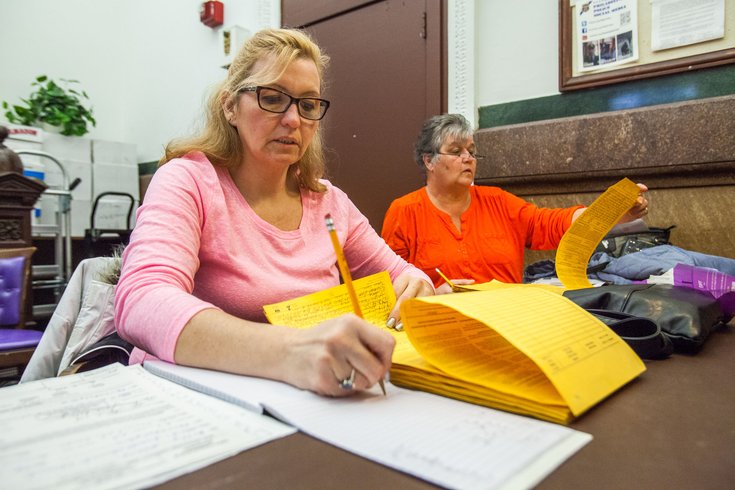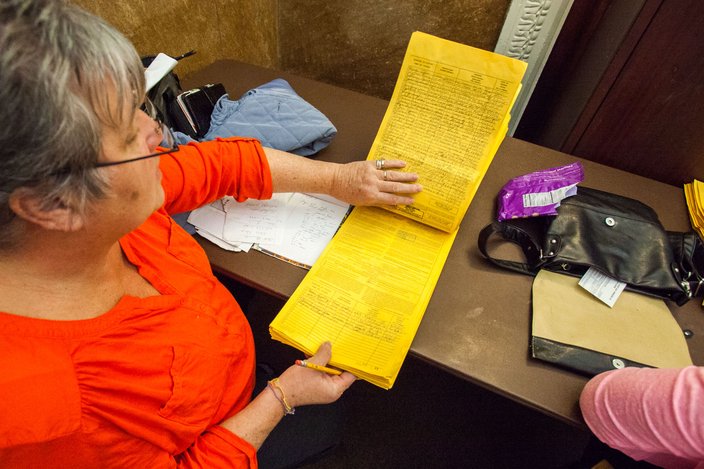After a rush of campaigning, it’s time for the handwriting experts and lawyers.
Now that candidates for Philadelphia mayor and city council have filed their nominating petitions full of signatures to qualify for a spot on the May 19 primary ballot, candidates can and will challenge each others’ paperwork. They will try to throw out signatures and, if enough are deemed invalid, remove their foe from the race. It is a procedural but sometimes dramatic part of the campaign.
How do trained legal experts know if a signature should be thrown out because it was forged or violated other rules, such as the requirement that signatories be registered voters?
“Like the Supreme Court described pornography, I know it when I see it,” said Charles Gibbs, a lawyer who has worked previously on signature challenges.
This part of the campaign can be brutal, according to Tim Dowling, the supervisor of elections, who called city politics a “blood sport.”
Local rules specify how many signatures a candidate for each office must collect. One thousand signatures are required for those running for mayor or an at-large seat on city council. Individuals vying for district seats on the council which represent specific areas of the city, must collect at least 750.
And the requirement is a real test, said David Thornburgh, the chief executive officer of the election watchdog
Committee of Seventy.
“It is not an insignificant hurdle,” said Thornburgh. “There is good reason for it. You want people to have passed the test that there is enough people willing to sign their name to make them sort of viable.”
Last Wednesday, the day after the signatures were due, campaigns began inspecting the signatures of their opponents. City employees in room 142 at City Hall flipped through compact disks that contained electronic copies of the petitions specifically requested by the steady trickle of individuals who filed into the Board of Election’s office.
Rules govern which signatures are valid and which ones may be challenged and thrown out. Candidates frequently try to collect more than they need as a buffer against challenges and as a way of gloating about their level of support and organization.
“We think it would be foolhardy for anyone to challenge,” said Sherrie Cohen, an at-large candidate for city council whose campaign submitted about 6,500 signatures. “You can see I’m working hard on this campaign by the number of signatures I’ve got.”
In the behind-the-scenes maneuvering, arguments about handwriting supplant discussions about the issues that can make a difference in a candidacy. This year's process is especially intense with many candidates vying for an open at-large city council, a situation that fosters more signature challenges, according to some experts.
“Although it is part of the political process in these elections, the goal of those challenges [is] to eliminate rivals,” Cohen said, adding that she had no plans to challenge the nomination petitions of other candidates.
Challenging signatures can, indeed, be an effective way to eliminate competition.
Former state Rep. Babette Josephs, a longtime Pennsylvania legislator who was seeking to regain her seat in 2014 after being out of office, was kicked off the ballot because of a challenge to her signatures. Joseph Corrigan, a political consultant who was working for Josephs' rival campaign at the time, identified problems with some of the 599 signatures Josephs turned in -- 300 were needed to appear on the ballot.
“As soon as they were turned in, we noticed there were a number of, I would call them irregularities, and we did hire a handwriting expert,” said Corrigan. “If you looked at some signatures on petitions, you could see they were in the same hand.”
Of the number needed, some were clearly invalid and when it was shown that one collector filled out his address incorrectly his work was tossed. That was curtains for the Josephs' campaign.
Corrigan, now advising the campaign of Democrat Paul Steinke, who is running for a city council at-large seat, said his candidate collected far more signatures than needed to show competence and potential.
“Running a serious professional campaign takes a serious candidate,” Corrigan said. “You hire professionals to make sure things like petitions are filed correctly.”
Donna Aument explains that sometimes there are hundreds of errors on petitions and reiterates the importance of fact-checking the documents. (Thom Carroll/For PhillyVoice)
Candidates and their volunteers braved the cold to knock on doors, relying on help from ward leaders to identify voters to sign petitions. Republican candidates in the heavily Democratic city can find it much more difficult to get enough signatures from Republicans voters.
“The chances are overwhelmingly … whoever signs your petition is going to be a Democrat,” said Republican city council at-large candidate Dan Tinney. To avoid that problem, his campaign used voting lists of registered Republicans to go door to door.
Petition challenges have to be filed by the end of business Tuesday; until then, Gibbs said, he will be getting in the office before the sun rises and leaving well after it sets.
Inspectors for the campaigns usually verify the registration of every signature collector; discounting a collector can lead to many candidate petitions being declared invalid, Gibbs explained. Proving signatures are forged is another way to eliminate petitions.
“I can tell when something is all in the same hand,” he said.
Inspectors look for the telltale signs of sketchy signatures. For example, are all the number one’s on a signature sheet written the same way?
“Some people write their ones straight up” others with a slight tilt to the right or left, Gibbs said.
And nomination petitions almost always come in with at least some number of voters listed who aren’t registered or have some other problem, said attorney Adam Bonin, who represents candidates.
“There is a natural error rate in gathering signatures,” Bonin said. What matters ultimately, though, is whether a candidate has enough to get over the threshold -- and appear on the ballot.
“If a candidate has 751 signatures [for a city council district seat] and you see a few that look shady and incomplete then it is worth a challenge,” Thornburgh said. “If a candidate comes in with 7,500 signatures, you would be much less inclined to challenge them.”
Candidates had about three weeks to collect signatures. They are given a week to file challenges. Those hoping to challenge sit with a data expert, according to Dowling, the supervisor of elections.
“They will go through all the petitions, if they have enough to put the person under the minimum required signatures, most likely they will file a petition,” he said. “Then the fun begins.”
“We are busy,” Dowling said.
Bonin tells candidates that getting just over the required number of signatures is never enough.
“I always say double is the minimum goal,” he said.

 Thom Carroll/for PhillyVoice
Thom Carroll/for PhillyVoice
